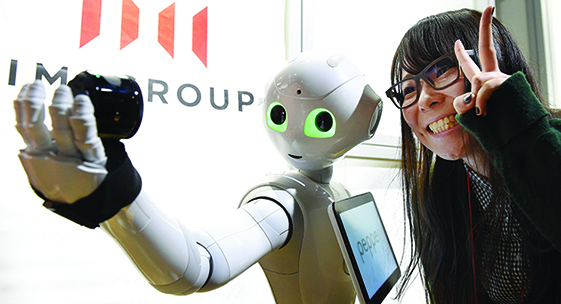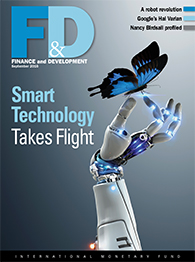
Humanoid robot Pepper takes selfie during app contest in Tokyo, Japan.
F&D Magazine Examines Impact of Smart Technology on Global Economy
August 31, 2016
- Smart technology can increase productivity and efficiency
- Human-like robots could exacerbate inequality
- Tech-based distance learning fosters improved policymaking
The newest issue of the IMF’s magazine, Finance & Development, focuses on how intelligent technology can transform economic life, for better and for worse.
IMF economists Andrew Berg, Edward Buffie, and Felipe Zanna designed an economic model to forecast the impact of intelligent robots on economic growth and income distribution. They project that as robots become more intelligent and plentiful, the “robot revolution” directs most of income to owners of capital and workers with human skills like creativity or empathy, who cannot be easily replaced. Output and productivity go up, but average wages fall and inequality rises. “This points to the importance of education that promotes the sort of creativity and skills that will complement—not be replaced by—intelligent machines,” they write.
And journalist Chris Wellisz probes the dark side of technology—cybercrime and cybertheft—that offers a new point of access for potential fraud. “Cyber-criminals bent on causing mayhem could bring down the entire global financial system,” writes Wellisz, “triggering an economic meltdown to rival the economic crisis of 2007-08,”
But the story has an upside too:
Google’s Chief Economist Hal Varian argues that technology is ultimately a force for good. “When the entire planet is connected,” he predicts, “we can expect to see a dramatic in human prosperity.”
The IMF’s Aditya Narain outlines the rise of a new breed of hybrid financial technology firms—“fintechs” that have the potential to transform the financial sector as they go from supplying financial firms with technology to competing against them.
And Sharmini Coorey, head of the IMF’s Institute for Capacity Development touts MOOCs and other technologies as tools to share the institution’s “vast pool of technical knowledge” and help build countries’ capacity for better policymaking.
This issue of the magazine also looks at the lessons the economics of language offers Europe on how best to integrate migrants, the impact of remittances on monetary policy, dedollarization in Peru, and the efficacy of public-private partnerships, among other topics. And F&D profiles Nancy Birdsall, the founding president of the Center for Global Development, who has dedicated her career to fighting poverty and inequality through compelling research.








